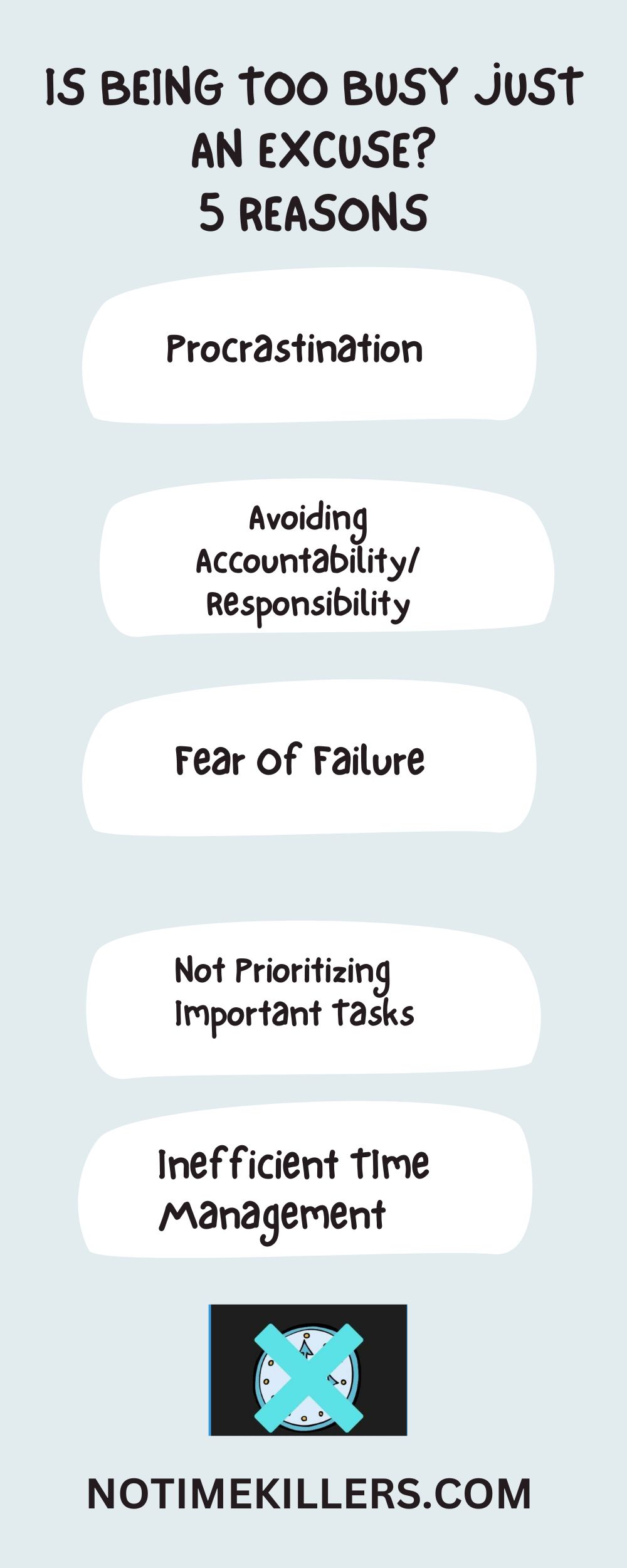I used to be someone who told “I’m too busy” excuses to others. It definitely didn’t help me at all, so is being too busy just an excuse?
Yes, it’s a very common excuse for people to not get much done. They’ll procrastinate often and don’t hold themselves accountable for getting things done.
The concept of busyness has been around for some time now. Not only is it applied in people’s personal lives, but it’s used in the workplace as well.
In this post, I’ll go over five factors as to why busyness continues to be a common excuse.
Also, I’ll provide some good practices to overcome the “I’m too busy for that” conundrum.
- The Procrastination Ploy
- Dodging Accountability
- Fear Of Failure
- Lack Of Prioritization
- Inefficient Time Management
- Best Solutions To Addressing Busyness

Is being too busy just an excuse?
Being “too busy” is a common excuse for people not to get much done each day.
Far too often, they procrastinate and don’t hold themselves responsible for getting things done.
Let’s go over some reasons why the “too busy” excuse is brought up too much by lazy people.
The Procrastination Ploy
Procrastination is known as putting things off until possibly the last minute. So why do people procrastinate?
It’s likely that people do not feel like doing the work at the moment, or the task at hand is not a priority.
When people say they’re too busy, the concept of busyness may be used as a form of procrastination.
Rather than confronting their most important tasks right away, they use their precious time to do easier activities, such as:
- Checking email
- Checking social media pages
- Scrolling their phones
When they do activities that aren’t challenging, they’re putting off ones that may help them move the needle forward.
If that’s working on a project that will take time, it’s important to not put that off while doing tasks that don’t require a lot of willpower.
Avoiding responsibility
Staying busy can often lead to avoiding responsibility for taking action. When someone doesn’t want to take on those responsibilities, they may use busyness as an excuse.
With someone saying that they’re too busy, they cannot justify taking on their personal or professional problems.
More so, that can lead to problems being unsolved and have an impact on an individual’s relationships with others.
Why is being too busy not a good excuse?
It’s not a good excuse because it reflects on procrastinating too often, along with not prioritizing your most important tasks.
Being busy often holds people back from living their true potential, which is crucial to living a fulfilled life.
Fear of failure
This factor is likely a big reason for the concept of busyness. Some people are scared that they’ll fail at trying something new or taking on a project that can be challenging for them.
When failure becomes an obstacle to someone, they’ll use the “busy” excuse to avoid failure as much as possible.
By not committing to achieving a realistic goal, an individual is throwing away their potential to succeed at it.

Starting a business
For example, if they’re concerned about starting a business but fear failing, it’s possible they may succeed in growing a business that solves a common problem for consumers.
Failure may be seen as a setback for many; however, it’s only a setback if you don’t take on the risks in the first place.
That mindset can take away great opportunities for someone to achieve their true potential at something.
A relevant article from notimekillers.com
Read next on “Why Failing Is Good For You: 5 Reasons Failure Is Necessary“, to learn why failure is needed to learn from your mistakes.
Lack of prioritization
When people say they’re too busy, that can be a sign they’re not prioritizing their tasks effectively.
In other words, they’re not able to determine which tasks need attention now and which have to get done as soon as possible.
Practicing busyness may often lead to focusing on tasks that are not as important. Some people may not be able to identify which tasks are high priorities, and which ones are of low priority.
In that case, some people may not make meaningful progress in accomplishing their personal or professional goals.
Why do people say I’m busy?
They use it as a way to show they’re committed to the work they’re doing. However, it can be used as an excuse to avoid holding themselves accountable, while not taking on difficult tasks.
Other reasons include a lack of confidence or the fear of failing at the tasks they’re presented with.
Inefficient time management
A big reason why people claim to be busy is due to a lack of time management.
Having poor time management skills can lead to staying busy all the time, but not making any meaningful progress.
By not managing their time effectively, individuals may end up being overwhelmed by the tasks confronting them.
When they feel overwhelmed and stressed out, they’re not able to complete them in a timely manner.
With poor time management skills, busyness will continue to be a thing if no real progress is made on completing the most important tasks.

Best solutions to addressing busyness
Some of my best solutions to addressing busyness are as follows:
Plan ahead
I find that planning ahead (daily and weekly) helps immensely.
I do regular planning at the beginning of the week and list out three-five things I have to get done that week.
Also, I plan out my days the night before. For example, I’ll do a little journaling where I write out what I accomplished earlier in the day.
Once I write those out, I’ll list out one-three tasks I need to prioritize and get done the next day.
I limit it to three because you may not get to completing five-ten different things in one day.
Prioritize your MITS first thing
Something I’ve been doing lately is tackling my most important tasks during the first part of my day.
So if I have projects I need to get to, I’ll usually work on those tasks within the first six hours after I wake up.
If I can get them done sooner, I don’t have to worry about pushing them off until later in the afternoon or evening hours.
Use the Pomodoro Technique
This technique is something I’ve been using for quite some time now. It’s basically broken down into the following steps:
- Set a time to do one task for 25 minutes straight
- After the 25 minutes is up, take a five-minute break: During that break, do something other than working or checking your phone. Instead, go for a walk, step outside and get fresh air, go to the bathroom, etc.
- Do it again for three more periods, followed by a longer break (15-30 minutes)

I find the Pomodoro Technique to be very effective in getting my MITS done in a timely manner. Also, it’s incredibly beneficial to managing my time better.
So if you’re struggling with managing your time, this technique can be useful if you need to work on tasks that require focus.
A relevant article from notimekillers.com
Read next on “How To Do The Pomodoro Technique: Is It Effective For Time?“, to learn how this technique can boost your focus and overall productivity.
Final Words
The concept of busyness has been around for a long time and continues to be a problem today. Far too many people put out that excuse to not get things done.
Luckily, there are ways to tackle the busyness problem. If you’re willing to take on risks (i.e. experience failure) and prioritize your most important tasks, it’ll be a lot easier.
Effective time management can help as well. If you make time your important asset, you’ll have a more sense of urgency when it comes to doing your tasks that need to get done soon.
So will you stop saying that you’re too busy? That’s up to you if a change is something you desire to see.
Your Turn: Do you often say that you’re too busy to do something?
I would like to get your thoughts on this topic. Are you guilty of telling others you’re too busy?
What’s the biggest factor behind you falling under the “I’m too busy” excuse? Is it due to procrastination?
Or could it be something else? Are you not confident in your abilities to succeed at something?
Feel free to share your thoughts by leaving a comment below. I look forward to reading your responses, and I’ll gladly respond promptly.
If you got value from this article, please bookmark this website to visit later for new posts every week. Spread the word to others. Sharing is caring! To get more of this type of content, you won't want to miss out my daily email letters. These are worth some golden nuggets and best tips to help you in your business. Sign up today! Count me in on the daily letters via email! For the latest videos that come out every week, subscribe to the YouTube channel. Also, be sure to check out our new space on Twitter X! YouTube Twitter (X) Medium Profile
Eric is the owner and chief editor of notimekillers.com. He takes great pride in helping people manage their time and grow their businesses. Eric is a firm believer in financial and time freedom, as he believes in financial independence and taking ownership of your time. “Time is your most important asset. It can be your best friend or worst enemy. How you use your time can shape the future you desire to have.” In his leisure time, Eric loves to write and read whenever possible. He enjoys going for long walks outdoors while doing in-home workout videos every week. You can also connect with Eric via LinkedIn.

